PARTY COMPETITION
summary
This research project investigates the strategic behavior of political parties within European multiparty systems, focusing on how parties respond to electoral incentives, coalition dynamics, and voter preferences. The project examines how electoral contexts influence party competition, revealing that parties adjust their issue emphasis and positioning based on the institutional environment and voter polarization. It also explores the impact of coalition participation on party responsiveness and electoral outcomes, highlighting the challenges junior coalition partners face in maintaining voter support. Additionally, the research delves into the phenomenon of party convergence and its role in the decline of mainstream parties, demonstrating that ideological similarity among major parties can lead voters to seek alternatives on the political fringes. Through a combination of quantitative analyses and comparative case studies, this project contributes to a deeper understanding of the evolving dynamics of party competition and voter behavior in contemporary European politics.
related publications
2024
-
 Parties’ Issue Adaptation Between ElectionsCornelius Erfort, Heike Klüver, and Lukas StoetzerJul 2024
Parties’ Issue Adaptation Between ElectionsCornelius Erfort, Heike Klüver, and Lukas StoetzerJul 2024Are parties responsive to short-term changes in election polls? While party responsiveness to election results has received much attention, we know little about the dynamics of issue attention between elections. In this study, we address this question based on the novel comprehensive PARTYPRESS Database. We rely on supervised machine learning methods to build a dynamic measure of parties’ issue attention on the basis of more than 250,000 press releases from 68 parties across nine countries from 2010 until 2020. We find little support that losing in the polls leads parties to change their issue attention. When political parties lose support in the polls, they do not clearly prioritise their owned issue, they do not pay more attention to popular issues, and they do not adapt the issue focus of successful competitors. These findings have important implications for our understanding of party responsiveness and the dynamics of electoral competition.
@misc{erfort_parties_2024, title = {Parties’ {Issue} {Adaptation} {Between} {Elections}}, author = {Erfort, Cornelius and Klüver, Heike and Stoetzer, Lukas}, year = {2024}, month = jul, publisher = {Open Science Framework}, doi = {10.31219/osf.io/6n3z4}, url = {https://osf.io/6n3z4}, urldate = {2025-05-09}, copyright = {https://creativecommons.org/licenses/by/4.0/legalcode}, }
2020
-
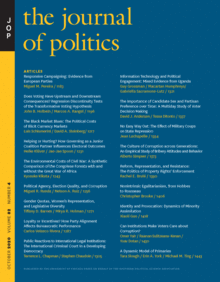 Helping or Hurting? How Governing as a Junior Coalition Partner Influences Electoral OutcomesHeike Klüver and Jae-Jae SpoonThe Journal of Politics, Oct 2020
Helping or Hurting? How Governing as a Junior Coalition Partner Influences Electoral OutcomesHeike Klüver and Jae-Jae SpoonThe Journal of Politics, Oct 2020Does joining a governing coalition as a junior partner influence a party’s subsequent electoral success? We argue that joining a multiparty cabinet as a junior partner considerably hurts a party’s future electoral prospects as junior partners cannot enact much of what they promised before the election and since they cannot sufficiently differentiate themselves from their larger coalition partner. To test our theoretical expectations comparatively and over time, we have compiled a comprehensive data set on the electoral performance of 307 political parties running in 219 elections in twenty-eight European countries from 1972 to 2017. To shed light on the underlying causal mechanisms, we additionally provide empirical evidence from an illustrative case study showing that the inability to deliver on election promises and a large degree of misperception among voters are important drivers of junior coalition parties’ electoral losses. Our findings provide important insights into the relationship between coalition governments and electoral competition.
@article{kluver_helping_2020, title = {Helping or {Hurting}? {How} {Governing} as a {Junior} {Coalition} {Partner} {Influences} {Electoral} {Outcomes}}, shorttitle = {Helping or {Hurting}?}, author = {Klüver, Heike and Spoon, Jae-Jae}, year = {2020}, month = oct, journal = {The Journal of Politics}, volume = {82}, number = {4}, pages = {1231--1242}, doi = {10.1086/708239}, issn = {0022-3816, 1468-2508}, url = {https://www.journals.uchicago.edu/doi/10.1086/708239}, urldate = {2025-05-09}, language = {en}, data = {https://dataverse.harvard.edu/dataset.xhtml?persistentId=doi:10.7910/DVN/KVIJSY}, } -
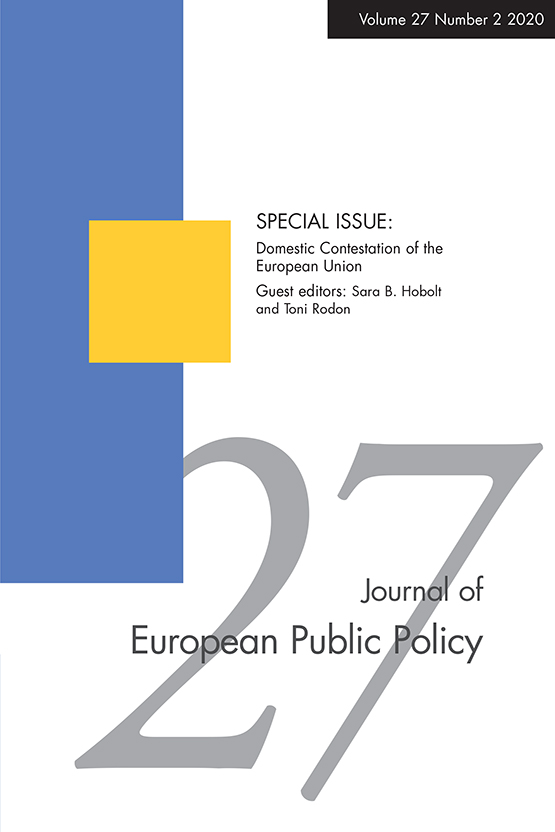 Responding to Far Right Challengers: Does Accommodation Pay Off?Jae-Jae Spoon and Heike KlüverJournal of European Public Policy, Feb 2020
Responding to Far Right Challengers: Does Accommodation Pay Off?Jae-Jae Spoon and Heike KlüverJournal of European Public Policy, Feb 2020Right-wing populist and far right parties are on the rise across Europe. While established parties are suffering dramatic electoral losses, right-wing parties are celebrating one electoral victory after another. To address their radical right challengers, many established parties have adopted a so-called ‘accommodative strategy’ by taking a more immigration-skeptical policy position. However, it is unclear whether such a strategy yields the expected benefits or whether such a position shift in turn hurts a party electorally. In this article, we find that mainstream left parties benefit from ‘going tough on immigration’ whereas it neither helps nor hurts mainstream right parties electorally. We arrive at this conclusion through an analysis of 16,811 vote choices in 15 elections in six countries from 1998 until 2013. Our findings have important implications for understanding what explains the rise of far right parties and the changing nature of electoral competition across Europe.
@article{spoon_responding_2020, title = {Responding to {Far} {Right} {Challengers}: {Does} {Accommodation} {Pay} {Off}?}, shorttitle = {Responding to {Far} {Right} {Challengers}}, author = {Spoon, Jae-Jae and Klüver, Heike}, year = {2020}, month = feb, journal = {Journal of European Public Policy}, volume = {27}, number = {2}, pages = {273--291}, doi = {10.1080/13501763.2019.1701530}, issn = {1350-1763, 1466-4429}, url = {https://www.tandfonline.com/doi/full/10.1080/13501763.2019.1701530}, urldate = {2025-05-15}, language = {en}, }
2019
-
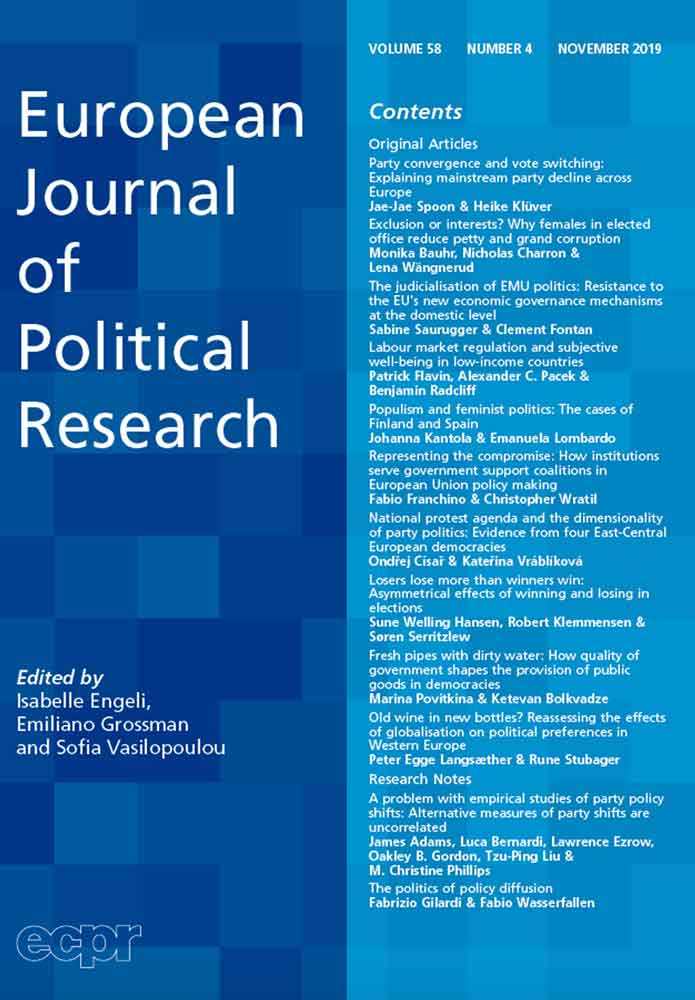 Party Convergence and Vote Switching: Explaining Mainstream Party Decline Across EuropeJae‐Jae Spoon and Heike KlüverEuropean Journal of Political Research, Nov 2019
Party Convergence and Vote Switching: Explaining Mainstream Party Decline Across EuropeJae‐Jae Spoon and Heike KlüverEuropean Journal of Political Research, Nov 2019How can one explain the significant vote losses of mainstream parties across Europe in recent years? In this article, it is argued that mainstream party convergence is an important determinant of the recent political and electoral volatility in European party systems. More specifically, it is hypothesised that as mainstream parties converge on the left‐right scale, voters will switch from supporting a mainstream party to a non‐mainstream party in the next election as they look for an alternative that better represents their ideological views. To test these theoretical expectations, data is combined from the Comparative Study of Electoral Systems and the Manifestos Project for nearly 15,000 vote choices of individual voters in 30 elections in 16 West and East European countries from 2001 until 2013. The findings have important implications for understanding the recent rise of non‐mainstream parties, the changing nature of party systems and the increasing complexity of cabinet formation across Europe.
@article{spoon_party_2019, title = {Party {Convergence} and {Vote} {Switching}: {Explaining} {Mainstream} {Party} {Decline} {Across} {Europe}}, shorttitle = {Party {Convergence} and {Vote} {Switching}}, author = {Spoon, Jae‐Jae and Klüver, Heike}, year = {2019}, month = nov, journal = {European Journal of Political Research}, volume = {58}, number = {4}, pages = {1021--1042}, doi = {10.1111/1475-6765.12331}, issn = {0304-4130, 1475-6765}, url = {https://ejpr.onlinelibrary.wiley.com/doi/10.1111/1475-6765.12331}, urldate = {2025-05-15}, language = {en}, }
2017
-
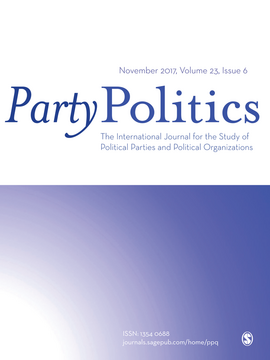 Challenges to Multiparty Governments: How Governing in Coalitions Affects Coalition Parties’ Responsiveness to VotersHeike Klüver and Jae-Jae SpoonParty Politics, Nov 2017
Challenges to Multiparty Governments: How Governing in Coalitions Affects Coalition Parties’ Responsiveness to VotersHeike Klüver and Jae-Jae SpoonParty Politics, Nov 2017How does governing in coalitions affect coalition parties’ responsiveness to voters? In this article, we seek to understand the relationship between political parties’ participation in multiparty governments and their responsiveness to voters. We argue that the extent to which coalition parties respond to policy priorities of voters is influenced by the divisiveness of policy issues within the cabinet and the ministerial responsibility for policies. To test our hypotheses, we combine data on the issue attention of 55 coalition parties from the Comparative Manifestos Project with data on government composition and data on the policy priorities of voters from the Comparative Study of Electoral Systems and various election studies in 45 elections across 16 European countries from 1972 to 2011. While we find that intra-cabinet divisiveness decreases coalition parties’ responsiveness, we find no effect for portfolio responsibility. Our findings shed light on the relationship between party competition and coalition governments and its implications for political representation.
@article{kluver_challenges_2017, title = {Challenges to {Multiparty} {Governments}: {How} {Governing} in {Coalitions} {Affects} {Coalition} {Parties}’ {Responsiveness} to {Voters}}, shorttitle = {Challenges to {Multiparty} {Governments}}, author = {Klüver, Heike and Spoon, Jae-Jae}, year = {2017}, month = nov, journal = {Party Politics}, volume = {23}, number = {6}, pages = {793--803}, doi = {10.1177/1354068815627399}, issn = {1354-0688, 1460-3683}, url = {https://journals.sagepub.com/doi/10.1177/1354068815627399}, urldate = {2025-05-09}, language = {en}, } -
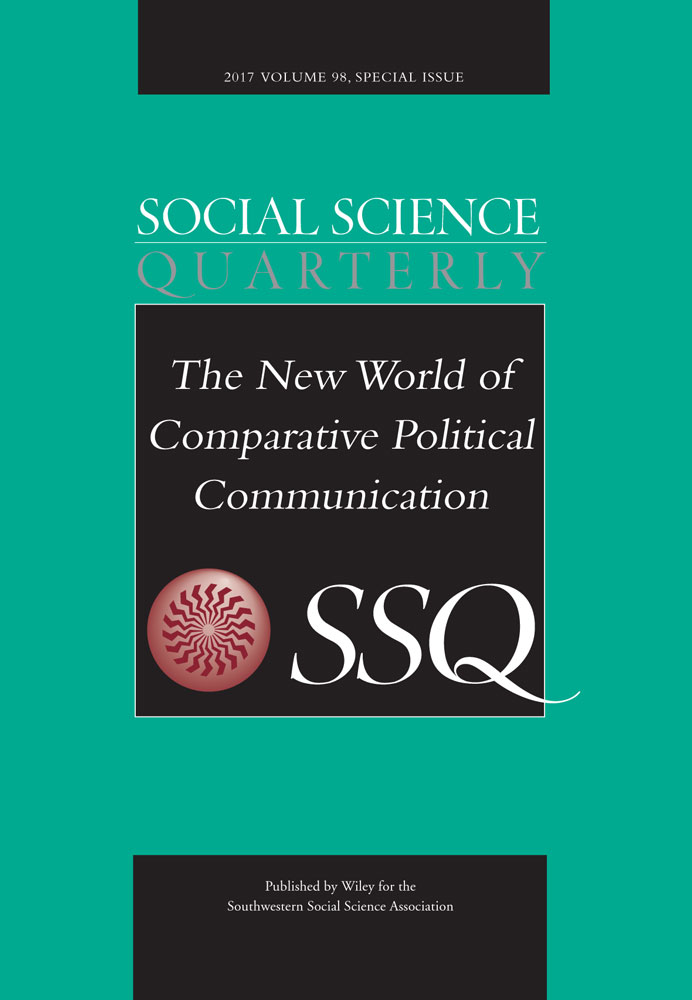 Where Have All the Leaders Gone? Evaluating the Dynamics of Parties’ Issue Attention in Coalition GovernmentsIñaki Sagarzazu and Heike KlüverSocial Science Quarterly, Sep 2017
Where Have All the Leaders Gone? Evaluating the Dynamics of Parties’ Issue Attention in Coalition GovernmentsIñaki Sagarzazu and Heike KlüverSocial Science Quarterly, Sep 2017Objective While selective issue emphasis is a widely recognized strategy of party competition, we have little knowledge about how coalition parties interact with each other when deciding which policy issues to emphasize. Therefore we ask: Who leads and who follows the issue agenda in coalition governments? Methods. We create an issue attention data set using quantitative text analysis from over 40,000 press releases. We use this data set and time series cross-section regression analysis to study the dynamics of coalition parties’ issue attention. Results. We find that junior coalition parties are more responsive to their senior partners than senior partners to their junior partners. Hence, while coalition partners generally follow each other, senior partners enjoy a stronger leadership role in the cabinet. Conclusion. Coalition parties indeed coordinate their issue priorities as they respond to each other’s issue agenda. However, due the asymmetric power distribution in coalition cabinets, it is not a negotiation process on equal footing.
@article{sagarzazu_where_2017, title = {Where {Have} {All} the {Leaders} {Gone}? {Evaluating} the {Dynamics} of {Parties}' {Issue} {Attention} in {Coalition} {Governments}}, shorttitle = {Where {Have} {All} the {Leaders} {Gone}?}, author = {Sagarzazu, Iñaki and Klüver, Heike}, year = {2017}, month = sep, journal = {Social Science Quarterly}, volume = {98}, number = {3}, pages = {1045--1060}, doi = {10.1111/ssqu.12437}, issn = {0038-4941, 1540-6237}, url = {https://onlinelibrary.wiley.com/doi/10.1111/ssqu.12437}, urldate = {2025-05-15}, copyright = {http://onlinelibrary.wiley.com/termsAndConditions\#vor}, language = {en}, } -
 Coalition Governments and Party Competition: Political Communication Strategies of Coalition PartiesIñaki Sagarzazu and Heike KlüverPolitical Science Research and Methods, Apr 2017
Coalition Governments and Party Competition: Political Communication Strategies of Coalition PartiesIñaki Sagarzazu and Heike KlüverPolitical Science Research and Methods, Apr 2017Coalition parties have to reconcile two competing logics: they need to demonstrate unity to govern together, but also have to emphasize their own profile to succeed in elections. We argue that the electoral cycle explains whether unity or differentiation prevails. While differentiation dominates at the beginning and the end of the legislative term in close proximity to elections, compromise dominates the middle of the term when coalition governments focus on enacting a common policy agenda. To test our theoretical claims, we draw on an innovative quantitative text analysis of more than 21,000 press releases published by coalition parties from 2000 until 2010.
@article{sagarzazu_coalition_2017, title = {Coalition {Governments} and {Party} {Competition}: {Political} {Communication} {Strategies} of {Coalition} {Parties}}, shorttitle = {Coalition {Governments} and {Party} {Competition}}, author = {Sagarzazu, Iñaki and Klüver, Heike}, year = {2017}, month = apr, journal = {Political Science Research and Methods}, volume = {5}, number = {2}, pages = {333--349}, doi = {10.1017/psrm.2015.56}, issn = {2049-8470, 2049-8489}, url = {https://www.cambridge.org/core/product/identifier/S2049847015000564/type/journal_article}, urldate = {2025-05-15}, copyright = {https://www.cambridge.org/core/terms}, language = {en}, data = {https://dataverse.harvard.edu/dataset.xhtml?persistentId=doi:10.7910/DVN/PZC0DM}, } -
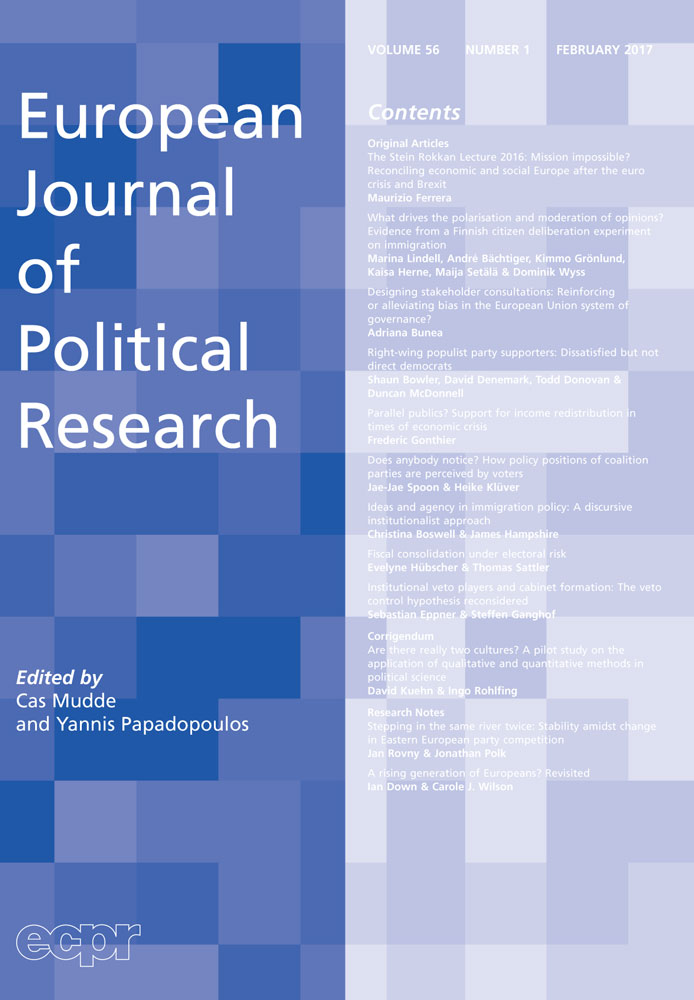 Does Anybody Notice? How Policy Positions of Coalition Parties Are Perceived by VotersJae‐Jae Spoon and Heike KlüverEuropean Journal of Political Research, Feb 2017
Does Anybody Notice? How Policy Positions of Coalition Parties Are Perceived by VotersJae‐Jae Spoon and Heike KlüverEuropean Journal of Political Research, Feb 2017Does governing in coalitions affect how coalition parties’ policy positions are perceived by voters? In this article, the authors seek to understand the relationship between parties’ participation in coalition governments and their perception by voters. Policy positions are an important instrument through which parties compete for the support of voters. However, it is unclear to what extent voters can correctly perceive the positions of parties when they govern together with other coalition partners. It is argued here that because of the blurred lines of responsibility in multiparty cabinets, it is difficult for voters to correctly perceive the positions of coalition parties. What is more, it is expected that the internal functioning of coalition cabinets affects the extent to which coalition parties struggle to get their message out to voters. It is hypothesized in the article that intra‐cabinet conflict is negatively related to misperception. To test their theoretical expectations, the authors combine data on the left‐right policy positions of political parties from the Comparative Manifestos Project with data on how these positions are perceived by voters gathered from the Comparative Study of Electoral Systems from 1996 to 2011. The findings shed light on the relationship between party competition and coalition governments, and its implications for political representation.
@article{spoon_does_2017, title = {Does {Anybody} {Notice}? {How} {Policy} {Positions} of {Coalition} {Parties} {Are} {Perceived} by {Voters}}, shorttitle = {Does {Anybody} {Notice}?}, author = {Spoon, Jae‐Jae and Klüver, Heike}, year = {2017}, month = feb, journal = {European Journal of Political Research}, volume = {56}, number = {1}, pages = {115--132}, doi = {10.1111/1475-6765.12169}, issn = {0304-4130, 1475-6765}, url = {https://ejpr.onlinelibrary.wiley.com/doi/10.1111/1475-6765.12169}, urldate = {2025-05-15}, copyright = {http://onlinelibrary.wiley.com/termsAndConditions\#vor}, language = {en}, }
2016
-
 Who Responds? Voters, Parties and Issue AttentionHeike Klüver and Jae-Jae SpoonBritish Journal of Political Science, Jul 2016
Who Responds? Voters, Parties and Issue AttentionHeike Klüver and Jae-Jae SpoonBritish Journal of Political Science, Jul 2016Do parties listen to their voters? This article addresses this important question by moving beyond position congruence to explore whether parties respond to voters’ issue priorities. It argues that political parties respond to voters in their election manifestos, but that their responsiveness varies across different party types: namely, that large parties are more responsive to voters’ policy priorities, while government parties listen less to voters’ issue demands. The study also posits that niche parties are not generally more responsive to voter demands, but that they are more responsive to the concerns of their supporters in their owned issue areas. To test these theoretical expectations, the study combines data from the Comparative Manifestos Project with data on voters’ policy priorities from the Comparative Study of Electoral Systems and various national election studies across eighteen European democracies in sixty-three elections from 1972–2011. Our findings have important implications for understanding political representation and democratic linkage.
@article{kluver_who_2016, title = {Who {Responds}? {Voters}, {Parties} and {Issue} {Attention}}, shorttitle = {Who {Responds}?}, author = {Klüver, Heike and Spoon, Jae-Jae}, year = {2016}, month = jul, journal = {British Journal of Political Science}, volume = {46}, number = {3}, pages = {633--654}, doi = {10.1017/S0007123414000313}, issn = {0007-1234, 1469-2112}, url = {https://www.cambridge.org/core/product/identifier/S0007123414000313/type/journal_article}, urldate = {2025-05-09}, copyright = {https://www.cambridge.org/core/terms}, language = {en}, data = {https://www.cambridge.org/core/journals/british-journal-of-political-science/article/who-responds-voters-parties-and-issue-attention/B0FE670EF39AD2275D423F15CF5ABA39#supplementary-materials}, } -
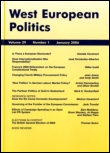 Setting the Agenda or Responding to Voters? Political Parties, Voters and Issue AttentionHeike Klüver and Iñaki SagarzazuWest European Politics, Mar 2016
Setting the Agenda or Responding to Voters? Political Parties, Voters and Issue AttentionHeike Klüver and Iñaki SagarzazuWest European Politics, Mar 2016Why do political parties prioritise some policy issues over others? While the issue ownership theory suggests that parties emphasise policy issues on which they have an advantage in order to increase the salience of these issues among voters, the riding the wave theory argues instead that parties respond to voters by highlighting policy issues that are salient in the minds of citizens. This study sheds new light on the selective issue emphasis of political parties by analysing issue attention throughout the entire electoral cycle. On the basis of a quantitative text analysis of more than 40,000 press releases published by German parties from 2000 until 2010, this article provides empirical support for the riding the wave theory. It shows that political parties take their cues from voters by responding to the issue priorities of their electorate. The results have important implications for political representation and the role that parties play in democracies.
@article{kluver_setting_2016, title = {Setting the {Agenda} or {Responding} to {Voters}? {Political} {Parties}, {Voters} and {Issue} {Attention}}, shorttitle = {Setting the {Agenda} or {Responding} to {Voters}?}, author = {Klüver, Heike and Sagarzazu, Iñaki}, year = {2016}, month = mar, journal = {West European Politics}, volume = {39}, number = {2}, pages = {380--398}, doi = {10.1080/01402382.2015.1101295}, issn = {0140-2382, 1743-9655}, url = {http://www.tandfonline.com/doi/full/10.1080/01402382.2015.1101295}, urldate = {2025-05-15}, language = {en}, }
2015
-
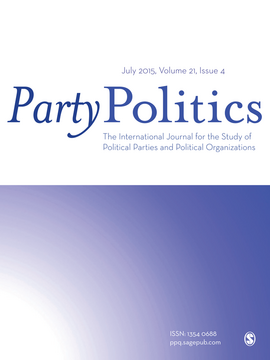 Bringing Salience Back in: Explaining Voting Defection in the European ParliamentHeike Klüver and Jae-Jae SpoonParty Politics, Jul 2015
Bringing Salience Back in: Explaining Voting Defection in the European ParliamentHeike Klüver and Jae-Jae SpoonParty Politics, Jul 2015What explains when Members of the European Parliament (MEPs) defect from their EP party group? While previous research has focused on the policy distance between an MEP’s national party and her party group, it has been overlooked that not all issues are equally important to national parties. As parties prioritize certain issues over others, we argue that it is both the distance and the salience of the issue for the MEP’s national party that explains defection. To test our theoretical claim, we explore more than 400,000 vote decisions across 1,948 different roll-call votes in four issue areas – agriculture, environment, social policy and external trade – from 1979 until 1999. To measure policy salience and distance, we combine roll-call analysis with data from the Euromanifestos Project. Our findings have important implications for understanding the dynamics of party competition and the role that national parties play in the European Parliament.
@article{kluver_bringing_2015, title = {Bringing {Salience} {Back} in: {Explaining} {Voting} {Defection} in the {European} {Parliament}}, shorttitle = {Bringing {Salience} {Back} in}, author = {Klüver, Heike and Spoon, Jae-Jae}, year = {2015}, month = jul, journal = {Party Politics}, volume = {21}, number = {4}, pages = {553--564}, doi = {10.1177/1354068813487114}, issn = {1354-0688, 1460-3683}, url = {https://journals.sagepub.com/doi/10.1177/1354068813487114}, urldate = {2025-05-15}, language = {en}, } -
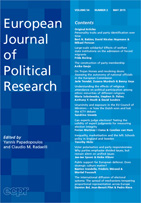 Voter Polarisation and Party Responsiveness: Why Parties Emphasise Divided Issues, but Remain Silent on Unified IssuesJae‐Jae Spoon and Heike KlüverEuropean Journal of Political Research, May 2015
Voter Polarisation and Party Responsiveness: Why Parties Emphasise Divided Issues, but Remain Silent on Unified IssuesJae‐Jae Spoon and Heike KlüverEuropean Journal of Political Research, May 2015How does voter polarisation affect party responsiveness? Previous research has shown that political parties emphasise political issues that are important to their voters. However, it is posited in this article that political parties are not equally responsive to citizen demands across all issue areas. The hypothesis is that party responsiveness varies considerably with the preference configuration of the electorate. More specifically, it is argued that party responsiveness increases with the polarisation of issues among voters. To test these theoretical expectations, party responsiveness is analysed across nine West European countries from 1982 until 2013. Data on voter attention and voter preferences with regard to specific policy issues from a variety of national election studies is combined with Comparative Manifestos Project data on parties’ emphasis of these issues in their election manifestos. The findings have major implications for understanding party competition and political representation in Europe.
@article{spoon_voter_2015, title = {Voter {Polarisation} and {Party} {Responsiveness}: {Why} {Parties} {Emphasise} {Divided} {Issues}, but {Remain} {Silent} on {Unified} {Issues}}, shorttitle = {Voter {Polarisation} and {Party} {Responsiveness}}, author = {Spoon, Jae‐Jae and Klüver, Heike}, year = {2015}, month = may, journal = {European Journal of Political Research}, volume = {54}, number = {2}, pages = {343--362}, doi = {10.1111/1475-6765.12087}, issn = {0304-4130, 1475-6765}, url = {https://ejpr.onlinelibrary.wiley.com/doi/10.1111/1475-6765.12087}, urldate = {2025-05-15}, copyright = {http://onlinelibrary.wiley.com/termsAndConditions\#vor}, language = {en}, }
2014
-
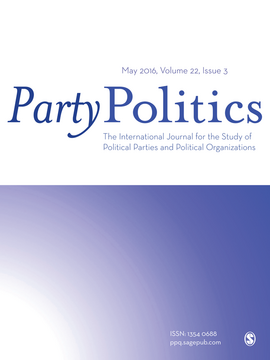 Bicameralism, Intra-Party Bargaining, and the Formation of Party Policy PositionsHanna Bäck, Marc Debus, and Heike KlüverParty Politics, Sep 2014
Bicameralism, Intra-Party Bargaining, and the Formation of Party Policy PositionsHanna Bäck, Marc Debus, and Heike KlüverParty Politics, Sep 2014How do political parties arrive at their policy positions? We conceptualize position formation in federalist countries as an intra-party bargaining process in which subnational parties compete with each other in an attempt to get their own positions into their national party manifesto. Drawing on theories about inter-party bargaining over ministerial portfolios, we hypothesize that the bargaining success of subnational parties depends on their parliamentary strength. We evaluate our hypotheses based on a comprehensive dataset on policy positions of national and subnational parties in Germany from 1990 until 2009. Our results show that German subnational parties that are powerful in the second parliamentary chamber (Bundesrat) are particularly successful in shaping the manifesto of their national party. The findings have important implications for our understanding of intra-party politics and position formation within political parties in Germany more specifically and federalist countries more generally.
@article{back_bicameralism_2014, title = {Bicameralism, {Intra}-{Party} {Bargaining}, and the {Formation} of {Party} {Policy} {Positions}}, author = {Bäck, Hanna and Debus, Marc and Klüver, Heike}, year = {2014}, month = sep, journal = {Party Politics}, volume = {22}, number = {3}, pages = {405--417}, doi = {10.1177/1354068814549343}, url = {https://journals.sagepub.com/doi/abs/10.1177/1354068814549343}, language = {en}, } -
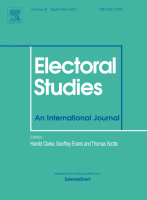 Do Parties Respond? How Electoral Context Influences Party ResponsivenessJae-Jae Spoon and Heike KlüverElectoral Studies, Sep 2014
Do Parties Respond? How Electoral Context Influences Party ResponsivenessJae-Jae Spoon and Heike KlüverElectoral Studies, Sep 2014How responsive are political parties to the issue priorities of voters? While there are numerous studies that examine policy position congruence between parties and voters or government responsiveness, we know little about the extent to which parties adjust their policy priorities to the issue concerns of voters. Following saliency and issue ownership theory, we argue that political parties listen to their voters by emphasizing policy issues in their election manifestos that have been prioritized by citizens. However, in line with second-order election theory, we expect that issue responsiveness varies with the electoral context. To test our theoretical expectations, we generated a novel dataset that combines data on issue attention of political parties from the Comparative Manifesto and the Euromanifesto projects with data on policy priorities of voters from the European Election Studies, the Comparative Study of Electoral Systems and various national election studies. We empirically test our theoretical claims based on a comprehensive analysis of 104 parties from 17 countries competing in 84 national and European elections from 1986 to 2011. Our findings have important implications for political representation in Europe.
@article{spoon_parties_2014, title = {Do {Parties} {Respond}? {How} {Electoral} {Context} {Influences} {Party} {Responsiveness}}, shorttitle = {Do {Parties} {Respond}?}, author = {Spoon, Jae-Jae and Klüver, Heike}, year = {2014}, month = sep, journal = {Electoral Studies}, volume = {35}, pages = {48--60}, doi = {10.1016/j.electstud.2014.04.014}, issn = {02613794}, url = {https://linkinghub.elsevier.com/retrieve/pii/S0261379414000547}, urldate = {2025-05-15}, language = {en}, }
2013
-
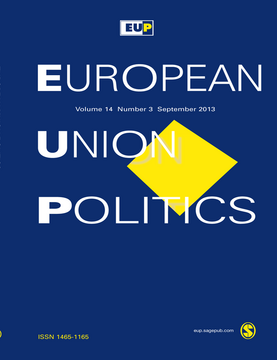 Ideological Congruency and Decision-Making Speed: The Effect of Partisanship Across European Union InstitutionsHeike Klüver and Iñaki SagarzazuEuropean Union Politics, Sep 2013
Ideological Congruency and Decision-Making Speed: The Effect of Partisanship Across European Union InstitutionsHeike Klüver and Iñaki SagarzazuEuropean Union Politics, Sep 2013How does ideological congruency affect the speed of legislative decision-making in the European Union? Despite the crucial importance of actor preferences, the effect of partisan alignments and ideological composition of the European institutions has largely been neglected. However, we argue that the ideological congruence between legislative bodies has an important effect on the duration of policy-making. We test our theoretical expectations based on a large new dataset on decision-making speed in the European Union using event history analysis. The findings confirm our theoretical claim indicating that the ideological distance between the European institutions slows down policy-making which has important implications for the problem-solving capacity of political systems more generally.
@article{kluver_ideological_2013, title = {Ideological {Congruency} and {Decision}-{Making} {Speed}: {The} {Effect} of {Partisanship} {Across} {European} {Union} {Institutions}}, shorttitle = {Ideological {Congruency} and {Decision}-{Making} {Speed}}, author = {Klüver, Heike and Sagarzazu, Iñaki}, year = {2013}, month = sep, journal = {European Union Politics}, volume = {14}, number = {3}, pages = {388--407}, doi = {10.1177/1465116512472938}, issn = {1465-1165, 1741-2757}, url = {https://journals.sagepub.com/doi/10.1177/1465116512472938}, urldate = {2025-05-09}, language = {en}, data = {https://journals.sagepub.com/doi/10.1177/1465116512472938#supplementarymaterial}, } -
 Explaining Policy Position Choice of Europarties: The Effect of Legislative ResourcesHeike Klüver and Toni RodonBritish Journal of Political Science, Jul 2013
Explaining Policy Position Choice of Europarties: The Effect of Legislative ResourcesHeike Klüver and Toni RodonBritish Journal of Political Science, Jul 2013While Europarties have received increasing attention in recent years, little is known about how they arrive at common policy positions, given their strong internal ideological heterogeneity. In order to explain position formation within Europarties, this article argues that national parties compete with each other in an attempt to upload their own policy positions to their Europarty. The article hypothesizes that their ability to succeed in these attempts depends on their legislative resources. The argument is tested by analysing position formation within the four major Europarties for all European Parliament elections between 1979 and 2004. The empirical results confirm that position choice is skewed towards parties with a large seat share, which has important implications for political representation in Europe.
@article{kluver_explaining_2013, title = {Explaining {Policy} {Position} {Choice} of {Europarties}: {The} {Effect} of {Legislative} {Resources}}, shorttitle = {Explaining {Policy} {Position} {Choice} of {Europarties}}, author = {Klüver, Heike and Rodon, Toni}, year = {2013}, month = jul, journal = {British Journal of Political Science}, volume = {43}, number = {3}, pages = {629--650}, doi = {10.1017/S0007123412000543}, issn = {0007-1234, 1469-2112}, url = {https://www.cambridge.org/core/product/identifier/S0007123412000543/type/journal_article}, urldate = {2025-05-09}, copyright = {https://www.cambridge.org/core/terms}, language = {en}, data = {https://www.cambridge.org/core/journals/british-journal-of-political-science/article/explaining-policy-position-choice-of-europarties-the-effect-of-legislative-resources/950BD8BEFB99ECCEEE20FBA2F16CADB6#supplementary-materials}, }